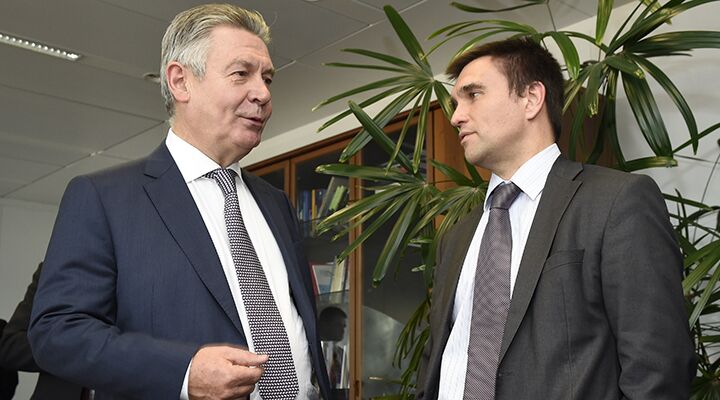
Russian Victory: Ukraine-EU Trade Deal on Hold
The clash between the West and Russia over Ukraine began with a trade deal. That fact is easily drowned out by the sound of two power blocs clashing, but it’s important.
The trade deal has come to symbolize Ukraine’s future. A pact with the European Union symbolizes Ukraine’s wish to be a democratic, European-style nation. An agreement with Russia would destine Ukraine to become an autocratic regime dominated by Putin’s Russia.
Former Ukrainian President Viktor Yanukovych flirted with both sides, until Russian President Vladimir Putin forced him to choose Russia. That choice spurred mass demonstrations and months of protests until Yanukovych was forced from power.
Yanukovych fell in February. The next month, Europe, which had done little to persuade Yanukovych to turn its way, offered Ukraine an €11 billion (us$14.2 billion) support package. That same month, new Prime Minister Arseniy Yatsenyuk signed the association agreement with the EU. After a few months’ more paperwork, the final parts of the agreement were signed on June 27.
Game over: Europe wins. Russia could make trouble in the east—perhaps even break off a chunk of territory, extracting his pound of flesh as a warning to other nations that were thinking of following suit—but the bulk of Ukraine was heading to Europe.
Now Russia has reversed all that. Russian Economy Minister Alexey Ulyukaev met with the European Trade Commissioner Karel De Gucht and Ukrainian Foreign Minister Pavlo Klimkin in Brussels on September 12. Before the meeting, the EU-Ukraine trade deal was set to enter into force in November. Now it has been delayed until Dec. 31, 2015. It’s been kicked into the long grass. In return, Russia dropped its threats to impose sanctions on Ukraine.
Both Ukraine’s government and the EU are trying to show this isn’t a cave in to Russia. They announced, for example, that Ukraine and the EU would fast-track the ratification of the agreement, holding a special ratification ceremony September 16. But with the deal not going into force for well over a year, this is nothing but show.
Pro-Westerners in Ukraine accuse President Poroshenko of caving in to Russia. The EU Observer reported that a “Ukraine-based EU diplomat” said that news of the delay caused “shock, astonishment.” Former Prime Minister Yulia Tymoshenko said the delay was “a betrayal of national interests.” Ukraine’s Deputy Foreign Minister Danilo Lubkivsky resigned in protest. The deputy governor of the central Dnipropetrovsk region wrote, “I am speechless,” in a Facebook post. “The last time this happened, we had EuroMaidan.”
“It was a surprise turnaround,” Bernd Johann, the head of Deutsche Welle’s Ukraine department, wrote. “The EU has bowed to pressure from Moscow,” he concluded. “Ukraine can evidently become European only with the consent of Russia.”
Russia, meanwhile, is clear that this is a victory. The government-run propaganda machine RT (formerly Russia Today) called the delay “a major diplomatic coup” for Moscow.
Britain’s Independent newspaper reported that the delay was the result of a deal between Putin and Poroshenko, citing “senior diplomatic sources.” It wrote that Poroshenko agreed to the delay in return for Russia ensuring that its soldiers and mercenaries in eastern Ukraine stick to the truce the two sides agreed to earlier.
The truth is, no one sitting around that table in Brussels had more than a lukewarm desire for Ukraine to side with Europe. The EU’s, and especially Germany’s, support for the idea has long been tepid. The bloc knows that it is not ready for a confrontation with Russia, and so does not want to provoke one before it has time to prepare. But this clash is causing it to get ready.
Now Putin has bought himself an extra year or so to make those deals. It’s not all roses for him—the deal allows Ukraine to sell its goods to Europe without any tariffs, meaning that Ukraine’s economy will now slowly become more integrated into the EU’s. Therefore Putin won’t dawdle. But with that symbolic deal pushed months into the future, he has plenty of time to bring the whole of Ukraine back into his fold.
That doesn’t necessarily mean he’ll get it all. But so far he’s clearly demonstrated that the bold use of force gets results. You can break one of geopolitics’ biggest taboos—unilaterally redrawing the borders of a European nation—and the West will do nothing.
Ultimately this naked use of force will stir Europe to build the power it needs to defend itself. In the meantime, Putin is proving himself a powerful figure to watch carefully. For the information you need to understand this man, read our article “Putin Won’t Just Survive, He’ll Thrive.”
